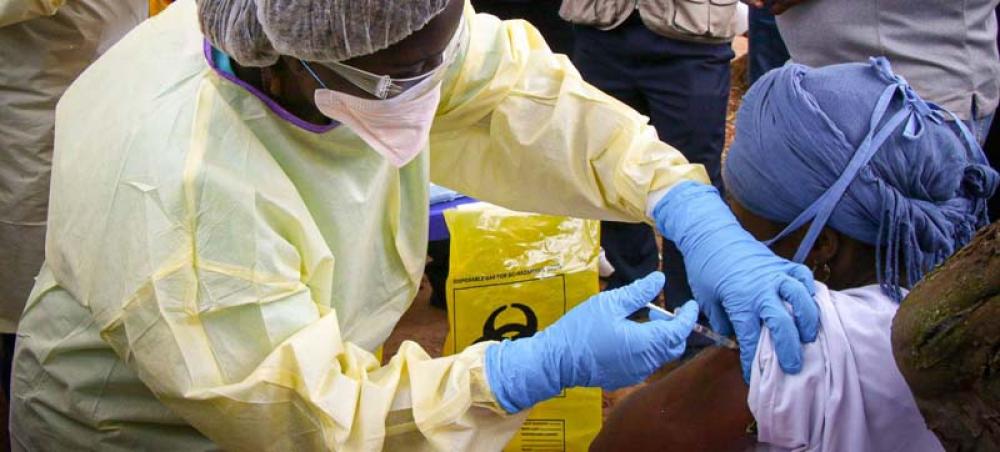Just Earth News | @justearthnews | 26 Feb 2021, 03:03 am Print
 Ebola
Ebola Image: WHO
New York: As a new Ebola outbreak threatens Guinea, six neighboring countries are urgently scaling up preparation and response efforts to prevent the further spread of the deadly virus, the UN World Health Organization (WHO) said on Thursday.
So far, nine cases have been reported in Guinea, leading to five deaths. While there have been no confirmed cases beyond the West African nation so far, the outbreak’s epicentre, Gouecke, N’Zerekore prefecture, is close to the borders of Liberia, Sierra Leone and Côte d'Ivoire, according to the UN health agency.
Scaling up response
Despite limited border controls, all six neighboring countries - Cote d’Ivoire, Guinea-Bissau, Liberia, Mali, Senegal and Sierra Leone - are urgently updating national response plans using the WHO readiness assessment tool, to detect, isolate and manage potential cross-border cases.
Ebola virus disease (EVD) is a rare but severe and often fatal illness. The average death rate is around 50 per cent, with rates having varied from 25 per cent to 90 per cent in past outbreaks.
The virus spreads through contact with the body fluids – such as vomit, faeces or blood – of an infected person, or through contaminated surfaces and materials, such as bedding and clothing.
'Hard lessons of history'
“We’ve learned the hard lessons of history and we know…preparedness works”, said Matshidiso Moeti, WHO Regional Director for Africa, stressing that “systematic surveillance, comprehensive preparations and strong, cross-border coordination are crucial to detecting any cases and ensuring that they are quickly isolated, treated and that vaccination of high-risk contacts begin quickly.
In addition to surveillance and screening at border crossing points, and in high-risk communities, rapid response teams are being deployed to border areas.
West African countries are also committed to stepping up testing and treatment facilities. So far 20 suspected cases have been reported across three countries bordering Guinea. All tested negative for Ebola.
Guinea vaccine push
Soon after the first case was reported, Guinea began an Ebola vaccine drive focusing on high-risk communities, especially in the epicentre Gouecke. To date, around 225 people have been vaccinated, including 66 high-risk contacts, according to WHO.
Meanwhile, the UN health agency has disbursed $1.25 million to support Guinea and to reinforce Ebola readiness in all six neighbouring nations.
Around 65 WHO experts are on the ground and the government has provided a charter flight to deliver the rVSV-ZEBOV Ebola vaccine, ultra-cold chain containers, personal protective equipment and other medical supplies from the capital Conakry to N’Zerekore.
DR Congo update
Moreover, the UN Central Emergency Response Fund (CERF) has also released $15 million to help Guinea and the Democratic Republic of the Congo (DRC) tackle the resurgence of Ebola, as well as preparedness in countries neighbouring DRC.
So far eight cases and four deaths have been reported in DRC’s North Kivu province, following the fresh Ebola outbreak declared there on 7 February.
The recent tragic death of Italian Ambassador Luca Attanasio in DRC, who was travelling in a UN World Food Programme (WFP) convoy, has highlighted the difficulties of dealing with outbreaks and the COVID-19 pandemic in areas of Africa where armed groups holds sway, hampering surveillance and treatment efforts.
- New hybrid Mpox strain surfaces in UK and India — WHO sounds global alert
- Deadly weight: Obesity now responsible for 1 in 10 infection deaths worldwide
- Coffee and tea: This everyday drink may help protect your brain from dementia
- Happy Chocolate Day! The sweet secret behind chocolate’s hidden benefits
- Cambridge study finds menopause affects memory, mood, and sleep





-1763561110.jpg)
